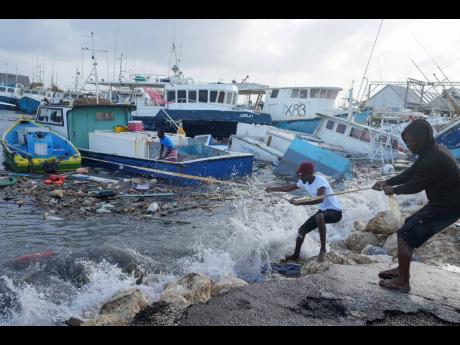Elizabeth Morgan | CARICOM SIDS: Hurricanes and climate change
The expectation was that the focus this week would have been on the 47th CARICOM Heads of Government Conference scheduled for Grenada, July 3-5, with CARICOM Day commemorated on July 4. An unexpected hurricane, called Beryl, caused its postponement.
Tropical Storm Beryl formed in the southeastern Caribbean by Barbados, St Vincent and the Grenadines, Grenada, and Tobago, rapidly developing into a powerful hurricane, category 5, an unprecedented situation for this time of the year. Hurricanes do not usually form this early in the season, June/July. However, as we have been experiencing, it has been unusually hot for May and June, with temperatures averaging highs in the 90s. The customary temperature for this time of the year was usually in the region of 30-31 degrees Celsius, or 86-87 degrees Fahrenheit.
Since May, the highest daytime temperatures have been trending at about 33 degrees Celsius (91 degrees Fahrenheit). This is 4-5 degrees above the normal temperature. The experts are telling us that this warming of the seas and the atmosphere is generating early and powerful hurricanes, which are a serious threat to the small island developing states in the Caribbean. This warming is due to climate change.
These powerful hurricanes had been rare in the Caribbean. Hurricane David struck Dominica in August 1979 after over 40 years without a direct impact. When Hurricane Gilbert hit Jamaica in September 1988, it was the first direct impact since 1951. Now, hurricanes of categories 3, 4 and 5 are more frequent and catastrophic.
THE ANTIGUA AND BARBUDA AGENDA FOR SIDS
The 4th International Conference on Small Island Developing States (SIDS), it will be recalled, was held in Antigua and Barbuda, May 27-30. The focus was on climate change, with the theme ‘Charting the Course Towards Resilient Prosperity’. The conference closed with the adoption of the ‘Antigua and Barbuda Agenda for SIDS (ABAS) – a Renewed Declaration for Resilient Prosperity’. The declaration, among other things, raised the concerns of SIDS about the impact of climate change, noting that “we acknowledge that the widespread, rapid and adverse impacts of climate change continue to pose increasing risks to SIDS and their efforts to achieve sustainable development, while representing the greatest threats to the survival and viability of their people and natural ecosystems”.
They stated that even with limiting global warming to 1.5 degrees Celsius above pre-industrial levels, SIDS will continue to incur severe loss and damage.
The SIDS stated their grave concern that global emissions are not in line with modelled global mitigation pathways consistent with the temperature goal of the Paris Agreement. They feared that the 2030 window for achieving this goal to contain global warming, which is crucial to the sustainable development of SIDS, is rapidly narrowing.
In this regard, the SIDS are seeking the support of the international community to urgently take action on climate change, pointing, among other things, to the need for accelerated actions on the effective implementation of the UN Framework Convention on Climate Change (UNFCCC) and the Paris Agreement.
This implementation not only involves adhering to the commitments to address climate change, including reducing the use of fossil fuels, but to also provide the financing needed by the SIDS to build their own resilience and advance sustainable development. It is essential to move from promises to actual implementation to realise the goals set out in the Antigua and Barbuda Agenda for SIDS.
A LONG AND UNCERTAIN HURRICANE SEASON
This hurricane season has just commenced. Already, there are two systems of concern to the Caribbean. Beryl already wreaked havoc in the southeastern Caribbean, from Barbados to Grenada. At the time of writing, the full damage was not known, but we can be certain there was damage, a setback for these small countries.
Beryl entered the Caribbean Basin as Category 5, and the projections showed it moving in a northwestern direction, with Jamaica in its sights. At this point, its proximity to Jamaica is not so clear. It is looking ominous. Preparations have to be for the worst scenario. We know that this very powerful storm could be disastrous for Jamaica’s people and economy. The country’s last encounter with a hurricane was Gustav on August 28, 2008, and it was Category 1, with the eye passing out to sea.
Projections have Beryl near or making landfall in Jamaica by Wednesday (today). My prayer is that this hurricane will follow the example of Gustav and shift to a more southerly path with its eyewall over the sea, and that it will weaken.
Another problem, though, is that a possible Debby could be travelling closely behind Beryl.
There are still five more months of the Atlantic/Caribbean hurricane season which goes into November and, on occasion, into December. We certainly have great cause for concern if it continues as it started, and the frequency predictions become reality. The evidence continues to mount that climate change is real and requires urgent action by the international community, which includes us in the Caribbean – look at the continuing deforestation, which includes removal of mature trees in urban areas, the construction of concrete jungles, and the overall damage to the environment.
No matter how small, we are all contributors to the environmental calamity now confronting us, and ameliorating the situation rests with all of us.
Elizabeth Morgan is a specialist in international trade policy and international politics. Email feedback to columns@gleanerjm.com .

